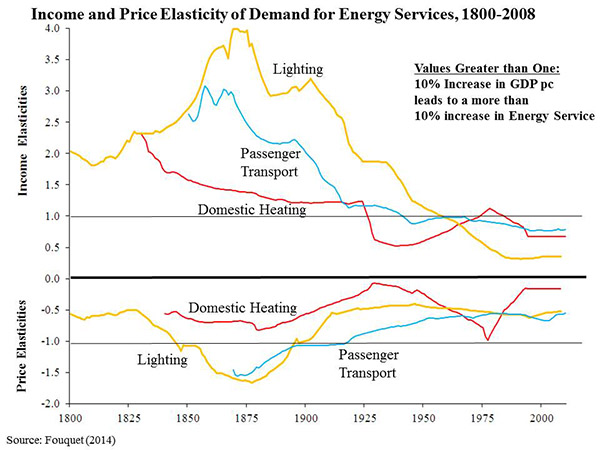Roger Fouquet
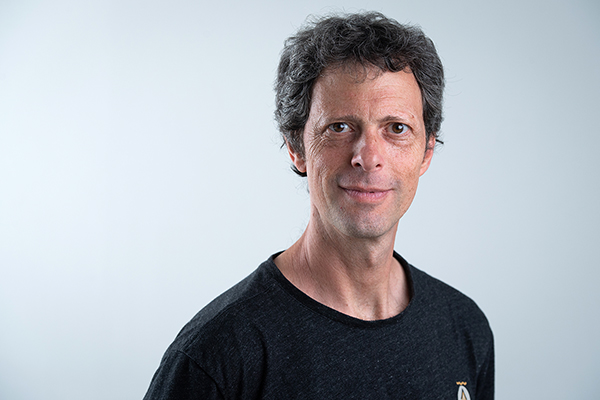
Roger worked at the Grantham Research Institute on Climate Change and the Environment from April 2013 until July 2022. He led the research on drawing lessons from economic history for green growth.
Check details of research currently in progress by Roger on ‘Net Domestic Consumer Surplus (1700-2017): A New Indicator of Consumer Welfare’
Background
Roger has been investigating the long run relationship between economic development, energy use and its environmental impacts over the last twenty years, introducing economic history to the analysis of energy issues.
An article, co-authored with Steve Broadberry, in the Journal of Economic Perspectives in 2015 presents evidence on very long GDP per capita in a number of European countries. It rejects the argument that these economies were stagnant prior to the Industrial Revolution. Instead, the evidence demonstrates the existence of numerous periods of economic growth before the nineteenth century – unsustained, but raising GDP per capita. It also shows that many of these economies experienced substantial economic decline. Thus, rather than being stagnant, pre-nineteenth century European economies experienced a great deal of change, and implies that recent theories of long run economic growth dependent on the concept of ‘stagnation followed by take-off’ need to be revised.
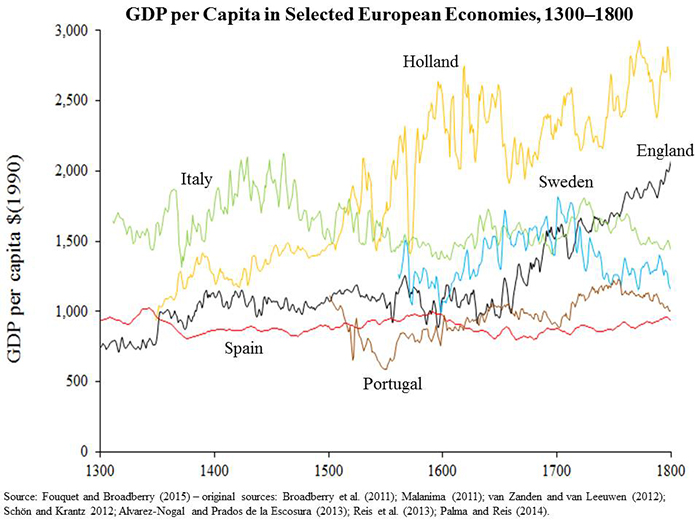
Roger’s 2018 article in The Energy Journal estimated the net benefits to consumers from energy transitions. The results confirm the hypothesis that the consumer surplus followed an inverse-U shape over time. There were dramatic increases in consumer surplus, which reflected the transformations in economies, societies and lifestyles that mobility and illumination provided in the nineteenth and first-half of the twentieth century. The net benefits of these technologies also appear to have been declining during the second half of the twentieth century, suggesting that future energy technologies and transitions may not benefit consumers as much as they did in the past.
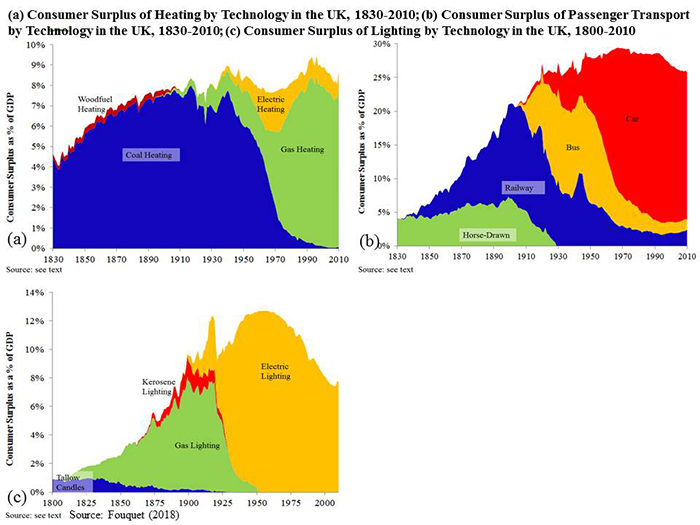
His 2014 article estimated trends in income and price elasticities of demand for heating, transport and lighting over the last two hundred years, showing an inverse-U trend for all income elasticities, as the economy developed. An understanding of these trends is vital for improving forecasts of energy use and carbon dioxide emissions.
In 1996, he was awarded the BIEE/Financial Times Andrew Holmes Memorial Award for his research into the impact of liberalisation on the green electricity market. In 2006, his joint article with Peter Pearson on very long run trends in lighting prices and consumption was chosen for the annual Campbell Watkins Award for Best Paper in The Energy Journal. In 2010, his book, ‘Heat, Power and Light: revolutions in energy services’ (Fouquet 2008), was selected by Choice Magazine as one of its Outstanding Academic Titles.
He is the editor of the Handbook on Energy and Climate Change, the Handbook on Green Growth, and The Economics of Renewable Energy. He is also the editor of the energy economics section of New Economic Papers, and an associate editor of the Journal of Energy History and the New Palgrave Dictionary of Economics.
Roger received his BA (Economics with Mathematics) in 1990 from the University of Sussex, his MSc (Energy Economics) in 1991, and his PhD in Economics in 1997, both from the University of Surrey.
Research in progress
Check details of research currently in progress by Roger on ‘Net Domestic Consumer Surplus (1700-2017): A New Indicator of Consumer Welfare’
Research interests
- The long-run relationships between economic development, energy use and environmental impacts.
Prospective PhD students
Roger welcomes enquiries from prospective PhD students with an economics/economic history background and interests in long run or historical research into economic development, energy, and/or the environment.
– Visit the ‘Study with us’ page for further information on applying to be a PhD student with us.
More information
Research
Research - 2023
To better understand the processes of digitalisation, dematerialisation and decarbonisation, this paper examines the relationship between energy and information for the global economy since 1850. I Read more

Research - 2022
The U.S. coal industry is in the midst of a transition. Changes in regulation and technological innovation from other fossils... Read more

This paper investigates the trade-offs between progressivity and effectiveness for a carbon tax versus an ‘excessive consumption’ levy. To do this, the authors compare the distribution of consumer welfare impacts and environmental effectiveness of an air travel carbon tax and a frequent flyer levy. Read more

Using historical data for the 1700–1914 period, this paper analyses the nature and direction of technical change in Britain. Read more

This paper investigates the structural transformation associated with the ‘twin transition’ of decarbonisation and digitalisation in European economies by placing it in a broader historical perspective. Read more

Research - 2021
This paper explores people's willingness to reduce travel consumption in support of the transition to a low-carbon pathway beyond COVID-19, using new survey data from UK car drivers and air travellers. Read more

This article presents a critical assessment of 40 years of research that may be brought under the umbrella of energy... Read more

Research - 2020
This paper aims to estimate the short-run impacts of air travel reductions due to COVID-19, and explores the potential for policy measures to curb demand and reduce carbon dioxide emissions beyond the lifetime of the pandemic with minimal impacts on welfare. Read more

This study estimates the combined direct and indirect rebound effects from energy efficiency improvements in the delivery of six energy... Read more

Research - 2019
Economies around the world have arrived at a critical juncture: to continue to grow fuelled by fossil fuels and exacerbate... Read more

Research - 2018
This major reference work brings together for the first time key articles on the economics of renewable energy. From a... Read more

Book review published in Environmental Innovation and Societal Transitions, Volume 33, November 2019, Pages 317-318. Read more

We present and analyze three powerful long-term historical trends in energy, particularly electrical energy, as well as the opportunities and... Read more

Roger Fouquet critiques Richard Rhodes’s survey of the inventors who fuelled civilization. Roger Fouquet, Nature 557, 162-163 (2018). doi: 10.1038/d41586-018-05081-5 Read more

The knowledge economy provides huge opportunities for economic growth and to become the cornerstone of future economic development by turning... Read more

Abstract Energy transitions have led to major advances in human wellbeing. However, little evidence exists about the scale of the... Read more

Research - 2017
A close relationship would help to drive a faster, more secure transition away from fossil fuels, says Roger Fouquet. Read more

This paper estimates the consumer surplus associated with heating, transport and lighting over more than 200 years and identifies the gains from a number of key energy transitions. Read more

Fouquet, R. (2017). In: Nature 544, 29–30 (06 April 2017) doi:10.1038/544029a Read more

The purpose of this paper is to identify the changes in the impact of energy shocks on economic activity –... Read more

Research - 2016
Abstract The relatively rare and protracted nature of energy transitions implies that it is vital to look at historical experiences... Read more
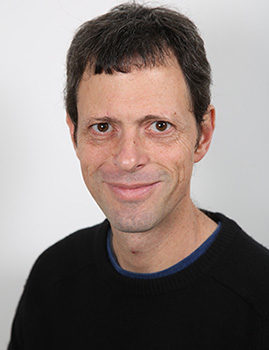
Abstract This paper draws lessons from long run trends in energy markets for energy and climate policy. An important lesson... Read more

Energy systems are subject to strong and long-lived path dependence, owing to technological, infrastructural, institutional and behavioural lock-ins. Yet, with... Read more

Fouquet, Roger (2016). In: Durlauf, Steven N. and Blume, Lawrence E., (eds.) The New Palgrave Dictionary of Economics. Palgrave Macmillan. Read more

Research - 2015
This paper investigates very long run pre-industrial economic development. New annual GDP per capita data for six European countries over the last seven hundred years paint a clearer picture of the history of European economic development. Read more

This paper sought to draw lessons from long run trends in energy markets for energy and climate policy. An important... Read more

This paper investigates very long run pre-industrial economic development. New annual GDP per capita data for six European countries over... Read more
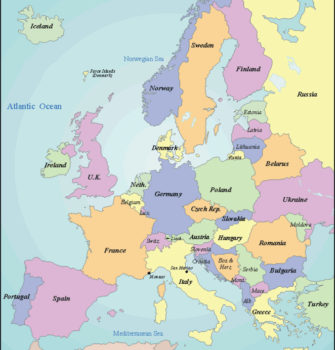
Journal of Natural Resources Policy Research, 2015. Vol. 7, Nos. 2-3, 147-156, https://dx.doi.org/10.1080/19390459.2015.1050786 Read more

Paper seeks to investigate how industrialised economies managed to achieve the transition from low to high levels of human capital, and goes on to identify lessons for green growth. Read more

Research - 2014
Data Set on the Consumption of Energy and Energy Services (1300-2008). Fouquet, R. (2014) Review of Environmental Economics and Policy 8(2). Read more
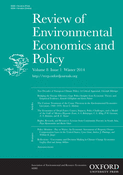
Working Paper 153 Abstract The purpose of this paper is to identify the changes in the impact of energy shocks... Read more

Research - 2013
Fouquet, R. 2013. Edward Elgar Publications. Cheltenham, UK, and Northampton, MA, USA. Read more

Research - 2012
Yeager, K., F. Dayo, M. Dominik, R. Fouquet, A. Gilau, R. Hosier, A. Miller, S. Rao, S. Sethi. 2012. In:... Read more

Fouquet, R., and P.J.G. Pearson. 2012. Economics of Energy and Environmental Policy, v.1, pp.83-100. Read more

Fouquet, R. 2012. Energy Policy 50 (Special Issue on Past and Prospective Energy Transitions), pp.130-41. Read more

Fouquet, R., and P.J.G. Pearson. 2012. Energy Policy 50 (Special Issue on Past and Prospective Energy Transitions), pp.1-7. Read more

Fouquet, R. 2012. Energy Policy 50 (Special Issue on Past and Prospective Energy Transitions), pp.62-71. Read more

Research - 2011
Fouquet, R. 2011. Ecological Economics, v.70, pp.2380-9 Read more

Data Set on the Price of Energy and Energy Services (1700-2010). Fouquet, R. 2011. Review of Environmental Economics and Policy, v.5, pp.196-218. Read more

Research - 2010
Fouquet, R. 2010. Energy Policy, v.38, pp.6586-96. Read more

Research - 2009
In: Hunt, L. and J. Evans (eds.). 2009. International Handbook of the Economics of Energy. Edward Elgar Publications. Cheltenham, UK,... Read more

Research - 2008
Fouquet, R. 2008. Edward Elgar Publications. Cheltenham, UK, and Northampton, MA, USA. Read more

Research - 2006
Fouquet, R., and Pearson, P.J.G. 2006. The Energy Journal, v.27, pp.139-77. Read more

Research - 2003
Pearson, P.J.G., and Fouquet, R. 2003. In: L. Hunt (ed.), Energy in a Competitive Market. Edward Elgar. Cheltenham. Read more

Fouquet, R. 2003. Climate Policy (special Emissions Trading issue), v.3, pp.143-55. Read more

Fouquet, R., and Pearson, P.J.G. 2003. World Economics, v.4, pp.93-119. Read more

Research - 2001
Grimstom, M., Karakousis, V., Fouquet, R., van der Vorst, R., Pearson, P.J.G, and Leach, M. 2001. Climate Policy, v.1, pp.155-171. Read more

Research - 1998
Fouquet, R. 1998. Energy Policy, v.26, pp.281-94. Read more

Fouquet, R., and Pearson, P.J.G. 1998. The Energy Journal, v.19, pp.1-41. Read more

Research - 1997
Fouquet, R., Hawdon, D., Pearson, P.J.G., Robinson, C., and Stevens, P.G. 1997. Energy Policy, v.25, pp.231-40. Read more

Research - 1995
Energy Economics, v.17, pp.237-47. Read more

Data
Data - 2023
Data set published in ‘The Digitalisation, Dematerialisation and Decarbonisation of the Global Economy in Historical Perspective: The Relationship between Energy... Read more

Data - 2022
Data set by Roger Fouquet on 26 March 2022. From: Fouquet (2020) Historical Energy Dataset. National Infrastructure Commission https://nic.org.uk/data/all-data/historic-energy/ Read more

Data - 2015
Dataset from: "Seven Centuries of European Economic Growth and Decline." Journal of Economic Perspectives, 29(4): 227-44. Read more

Data - 2014
From: Fouquet, R. (2014) Long run demand for energy services: income and price elasticities over 200 years. Review of Environmental... Read more

Data - 2011
From: Fouquet, R. (2011) Divergences in long run trends in the prices of energy and energy services. Review of Environmental... Read more

Books
Books - 2019
Economies around the world have arrived at a critical juncture: to continue to grow fuelled by fossil fuels and exacerbate... Read more

Books - 2018
This major reference work brings together for the first time key articles on the economics of renewable energy. From a... Read more

Books - 2013
Fouquet, R. 2013. Edward Elgar Publications. Cheltenham, UK, and Northampton, MA, USA. Read more

Books - 2008
Fouquet, R. 2008. Edward Elgar Publications. Cheltenham, UK, and Northampton, MA, USA. Read more

Events
Events - 2016
Events - 2015
News
News - 2016
The Shift Podcast, February 1 2016 This content is no longer available online Read more



